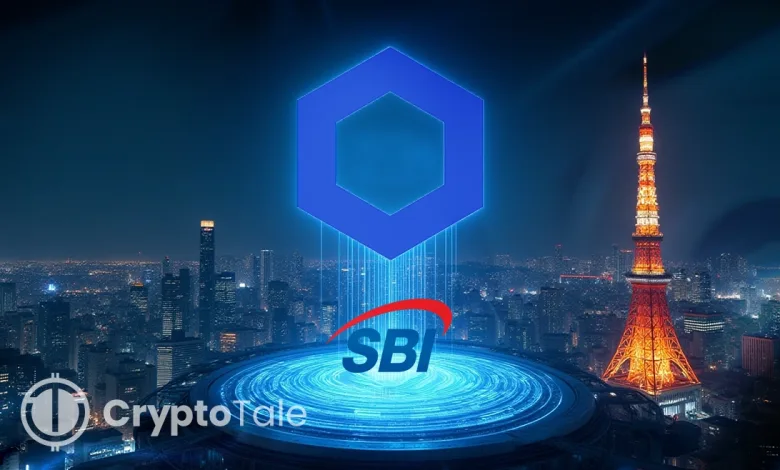SBI Deepens Ties With Chainlink to Power Tokenized Assets

- SBI Digital Markets adopts Chainlink CCIP as its exclusive interoperability framework.
- The partnership enables private, compliant tokenized asset transfers across chains.
- SBIDM’s integration builds on prior work with UBS under Singapore’s Project Guardian.
SBI Digital Markets (SBIDM), the digital asset arm of Japan’s SBI Group, has strengthened its partnership with Chainlink to connect traditional finance (TradFi) with decentralized finance (DeFi). Announced on November 5, the deal makes Chainlink’s Cross-Chain Interoperability Protocol (CCIP) the main system SBIDM will use to manage tokenized real-world assets across both private and public blockchains.
Chainlink To Power SBIDM Platform
By adopting Chainlink’s CCIP, SBIDM can securely move tokenized assets between different blockchain networks while following all privacy and compliance rules. The company will also use CCIP Private Transactions to keep sensitive details like transaction amounts and the parties involved confidential and protected.
Notably, the integration transforms SBIDM’s platform beyond issuance and distribution into a full-service digital asset hub. It will support the entire lifecycle of tokenized assets, including compliant issuance, purchase settlement, and secondary trading using tokenized cash across jurisdictions. This is a step forward in connecting institutional markets to blockchain infrastructure.
Chainlink CCIP provides SBIDM with the framework to transfer assets seamlessly between permissioned networks and public chains. The collaboration also builds on previous success under the Monetary Authority of Singapore’s Project Guardian, where SBIDM, UBS Asset Management, and Chainlink automated fund management workflows using smart contracts.
Expanding Infrastructure for Institutional Adoption
The latest announcement expands the relationship between Chainlink and the broader SBI Group, which oversees over ¥10 trillion ($66 billion) in assets. In August 2025, SBI and Chainlink joined forces to push digital asset adoption across Asia-Pacific, focusing on building safer and more compliant blockchain systems.
SBIDM’s move to use Chainlink’s CCIP fits into that mission as it develops a regulated setup for digital securities. The company is also trying out Chainlink’s Automated Compliance Engine (ACE), which helps apply real-time compliance rules for onchain transactions as regulations evolve.
CK Ong, Chief Operating Officer of SBI Digital Markets, stated that the collaboration supports the company’s vision of an interconnected global capital market. He added that demand for tokenized assets continues to grow, and interoperable infrastructure is key for scaling these products securely.
Chainlink’s Chief Business Officer, Johann Eid, noted that the partnership equips SBIDM with institutional-grade interoperability and privacy. He emphasized that these capabilities will help SBIDM deliver a compliant environment for tokenized asset transactions across multiple networks.
Related: Japan’s SBI Group Joins Chainlink to Build Crypto Tools for Banks
Prior Milestones and Global Context
Chainlink and SBI Digital Markets are strengthening their partnership after running successful tests that showed how blockchain can help big financial institutions work more efficiently. Together with UBS Asset Management, they completed a full trial using Chainlink’s technology (CCIP) to automate fund processes while keeping everything compliant and secure.
Outside Japan, Chainlink has also worked with major players like Swift, Euroclear, and Ondo Finance to bring real-world assets, such as bonds or funds, onto blockchain systems. These efforts aim to make transactions faster, clearer, and better connected to traditional financial systems.
A study by SBI Digital Asset Holdings found that about 76% of financial institutions are interested in investing in tokenized securities because they promise quicker transactions and lower costs. However, many say that the lack of reliable large-scale blockchain infrastructure is holding them back. SBIDM’s use of Chainlink’s CCIP helps fix this by offering a safe and standardized way for institutions to handle cross-chain transactions.
This partnership also shows SBI’s larger plan to bring blockchain into more of its operations. By using Chainlink’s technology, SBIDM is setting itself up to manage many kinds of digital assets, like securities and real estate, under regulated and secure systems. In doing so, both companies are moving closer to linking traditional markets with the digital financial world.




